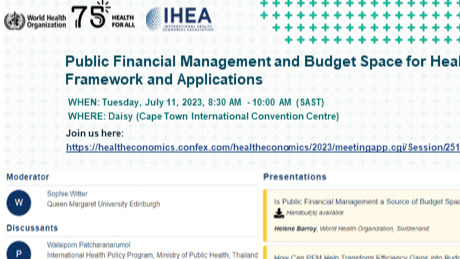In recent years, the concepts of fiscal space and fiscal space for health have evolved to incorporate new views related to both revenue and expenditure. The International Monetary Fund (IMF) expanded the list of factors impacting overall fiscal space to include a set of 50 key components covering economic growth, revenue, fiscal policies, debt, contingent liabilities, access to capital market financing, deficit rules and monetary policies.
On the expenditure side, public financial management (PFM) has been added as another important driver to maximize budgetary space for health. Fifteen years after Heller first introduced the concept of fiscal space for health, there is a growing consensus that it is not viewed as solely a question of finding additional revenues. Space for health sector’s budget is also seen as potentially deriving from improved financial management policies and practices in the health sector.
Moderator:
Discussants:

